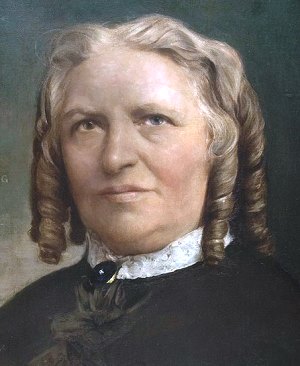| The Public Paperfolding History Project
Last updated 7/10/2025 x |
|||||||
| The Paperfolding of Elise Van Calcar | |||||||
********** Introduction Elise Van Calcar (1822 to 1904), birth name Eliza Carolina Ferdinanda Fleischacker, was a Netherlandish writer of both fiction and non-fiction works. According to Wikipedia: 'Elise van Calcar's writing career can be divided into four periods: from 1842 to 1858 she wrote literary work, from 1858 to 1865 she published on education and upbringing, from 1865 to 1873 she advocated feminist goals and from 1873 to 1898 she wrote about spiritualism.' In fact, however, her writing and translating of educational works extended well beyond 1865. This page is being used to collect information about about her work promoting kindergarten education in general and in particular where this promotional work touches on paperfolding. ********** Chronology 1858 Van Calcar describes in her book 'Foebel's Methode' (see below) how, in 1858, she met Baroness Bertha von Marenholz-Bulow and became a convert to the Froebelian cause, and how she began to promote these ideas in the Netherlands.
********** 1860 According to Wikipedia 'In 1860, she caused a sensation with a series of public lectures on the way in which kindergartens could stimulate the development of young children.' ********** 1863 Publication of 'De Kleine Papierwerkers': Volume 1, Volume 2, Volume 3 and Volume 4. According to Wikipedia in this year she also 'founded the magazine De Hoop der Toekomst (The Hope of the Future) in which the views of the German pedagogue Friedrich Fröbel were propagated.' ********** 1864 According to Wikipedia 'Minister J.R. Thorbecke was convinced of her ideas and saw the need to renew nursery education. In 1864 he appointed Elise as an education inspector, a post she was only able to hold for a short time due to health reasons.' ********** 1865 Publication of 'Der Frobelsche Kartonwerkers'. According to Wikipedia 'In 1865 she founded Het Nederlandsch Opvoedingshuis, first in Leiden, later in Wassenaar where her husband was mayor. This was mainly a model training institute for girls from the upper class. The institute was forced to close in 1873 due to a lack of staff, money and a declining number of pupils.' ********** 1875 Publication of 'Froebels Methode'. ********** 1880 Publication of 'Maakt de Kinderen Gelukkig'. ********** 1881 Publication of 'De Jonge Werkman: Het Vlechten', a translation into Dutch by Van Calcar of 'Des Kindes Erste Beschaftigungsbuch' by E Barth and W Niederley, which had been published in 1876. ********** |
|||||||



